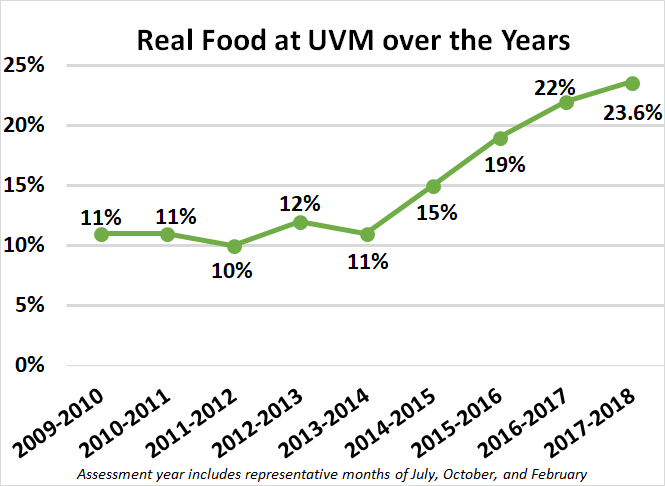The national Real Food Challenge organization provides tools to institutions to support the development of a sustainable food economy, and provides networking opportunities, learning, and leadership development to thousands of emerging student leaders.
The primary campaign is to shift 20 percent of existing university food budgets in the U.S. (equivalent to approximately $1 billion) from conventional agricultural products to local, ecologically sound, fair and humane products by 2020.
Since 2008, students in the Real Food Challenge network have worked with their dining directors and other campus stakeholders to secure over $60 million worth of pledges to purchase more local, fair, sustainable, and humane food. This work has been done using two main tools: Real Food Calculator and the Real Food Campus Commitment.
The Real Food Challenge @ UVM
Food systems is a popular topic in this state, and the University of Vermont leads the way nationally in supporting the movement. The Real Food Challenge at UVM aims to incorporate the values of sustainability, justice, and health into UVM Dining’s purchasing decisions.
The Real Food Challenge empowers students to hold our University accountable to us. Students are clients of the University of Vermont, thus we have collective bargaining power to fundamentally change food purchasing. Engaging in purchasing decisions with the University of Vermont has significant economic impacts on the food economy that we seek.
There are a number of ways that you can support or get involved in the movement. To learn more about the criteria that qualify food as real, and what products are real across campus, check out our Real Food On Campus page.
How it happens
- Since 2009, UVM students have been auditing UVM's food purchases using the Real Food Calculator, as one of the first universities to pilot the tool.
- In the 2011-2012 academic year, UVM students advocated for UVM to sign the Real Food Campus Commitment as part of the Real Food Challenge national campaign. Their efforts came to fruition in March 2012, when Interim President John Bramley signed the commitment, thereby pledging UVM to purchasing 20% "Real Food" by 2020.
- The Real Food Working Group, a dedicated group of students, faculty, and staff, is responsible for coordinating the implementation of the Real Food Campus Commitment.
- In April 2017, UVM announced it had surpassed 20% Real Food and set a new goal of sourcing 25% Real Food by 2020.


